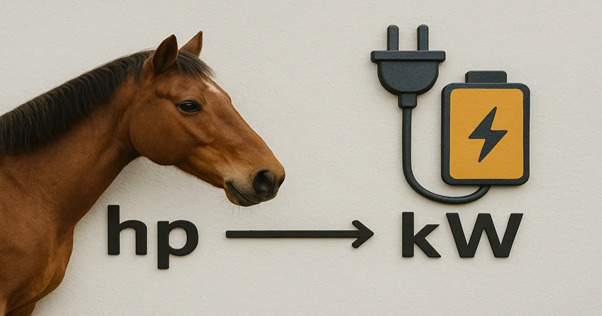For years, the way to describe a vehicle's power for automotive enthusiasts has been through "horsepower (HP)." However, with the rise of electric vehicles, this classic unit of measurement is now giving way to kilowatt (kW) values.
So really, how much horsepower equals 1 kW? Why is power expressed differently in electric vehicles now?
What is Kilowatt (kW)?
Kilowatt (kW) is the unit of measurement that indicates power, meaning the work done per unit of time. When it comes to electric vehicles, it expresses how much energy the motor can produce.
1 kilowatt (kW) = 1000 watts (W).
What Does kW Mean in Electric Vehicles?
In electric vehicles, the kW value indicates the motor's capacity to convert electricity received from the battery into mechanical energy. In other words, the higher the kW, the more powerful the vehicle's motor is.
What is Horsepower (HP)?
Horsepower (HP) is the unit of measurement that shows a motor's mechanical work capacity, meaning how much energy it can produce in a given period.
1 Horsepower = 746 Watts (approximately 0.746 kW).
What Does Horsepower Represent Today?
Horsepower was used for years as a performance indicator in internal combustion vehicles. However, with electric vehicles, expressing power in kilowatts (kW) is now a more accurate approach.
How is kW - HP Calculation Done?
Simply put: 1 kW ≈ 1.36 horsepower (HP). This means that an electric vehicle with 100 kW of power is equivalent to approximately 136 horsepower. However, beyond this mathematical conversion, the feeling of power in electric vehicles is very different.
- In internal combustion engines, maximum torque is generally achieved at high RPMs.
- In electric motors, maximum torque is available from zero RPM.
Therefore, although a 200-horsepower gasoline vehicle and a 200-horsepower electric vehicle may appear to have the same power, they offer completely different experiences in terms of acceleration feel and response time.
How is Power Measured in Electric Vehicles?
In electric vehicles, motor power is directly related to battery output (voltage × current) and motor efficiency. Mathematically, power is calculated with the following basic electrical formula:
Power (kW) = Voltage (V) × Current (A) ÷ 1000
For example: If a vehicle draws 300 amperes in a 400-volt architecture:
400 × 300 ÷ 1000 = 120 kW
This means this vehicle produces approximately 163 horsepower.
Most Preferred Electric Vehicle Motor Powers Worldwide
In the electric vehicle market, motor power plays a determining role not only in performance but also in range, energy efficiency, and driving comfort.
When examining user preferences worldwide, motors in the range of 55 kW to 160 kW are most preferred across a wide spectrum, from compact urban models to high-performance SUVs.
This power range stands out as the "ideal balance point" in the global electric vehicle market, offering both economical energy consumption and satisfying acceleration and traction power.
| Segment | Power Range (kW) | Horsepower (HP) | Description |
|---|---|---|---|
| Mini & City EVs | 40 – 70 kW | 54 – 95 HP | Focused on low consumption, city range, and ease of use. Typically equipped with 30–45 kWh battery. |
| Compact Hatchback & Sedan | 80 – 120 kW | 108 – 163 HP | Most common power class. Suitable for family use, offering 300–450 km range. |
| Mid-Size SUV & Sedan | 130 – 200 kW | 177 – 272 HP | 0–100 km/h acceleration typically 6–8 seconds. Balanced performance and efficiency. |
| Premium & Performance Models | 250 – 400 kW | 340 – 544 HP | Dual motor (AWD) systems with high traction and torque. Standard in premium segment. |
| High Performance / Sports EVs | 450 – 800 kW | 612 – 1088 HP | Triple motor systems, torque vectoring, 0–100 km/h in 3 seconds. The new definition of performance. |
kW → Horsepower Conversion Table
Although power in electric vehicles is now expressed in kilowatts (kW), many users still prefer to evaluate performance based on horsepower (HP) values. You can quickly find this conversion in the table below.
| Power (kW) | Horsepower (HP) | Power (kW) | Horsepower (HP) |
|---|---|---|---|
| 55 kW | 74.8 HP | 100 kW | 136.0 HP |
| 60 kW | 81.6 HP | 110 kW | 149.6 HP |
| 66 kW | 89.8 HP | 120 kW | 163.2 HP |
| 80 kW | 108.8 HP | 140 kW | 190.4 HP |
| 85 kW | 115.6 HP | 150 kW | 204.0 HP |
| 90 kW | 122.4 HP | 160 kW | 217.6 HP |
Why is kW a More Accurate Measure?
Horsepower is a value that historically emerged during the steam engine era and is now used more out of habit.
In the electric world:
- kW directly represents energy conversion efficiency.
- It is a standard unit (used by EV manufacturers worldwide).
- It provides drivers with a technically meaningful comparison between charging, range, and performance.
In short; in electric vehicles, we talk about "kilowatts" not "horsepower."
BMW i4 and iX Models
Looking at the BMW family represented by Borusan Otomotiv:
- BMW i4 eDrive40: 250 kW (340 HP)
- BMW iX xDrive50: 385 kW (523 HP)
- MINI Cooper SE: 135 kW (184 HP)
What these models have in common, beyond their power values on paper, is the instant response and the pleasure of acceleration with zero noise. This reveals the "silent power" philosophy of electric driving.
Sources
- Convert kW to HP – UnitConverters.net
- kW to HP – https://www.rapidtables.com/convert/power/kw-to-hp.html
- Engine power – https://en.wikipedia.org/wiki/Engine_power
- EVCify Teknoloji – https://evcify.com/
- EV Database – https://ev-database.org/










